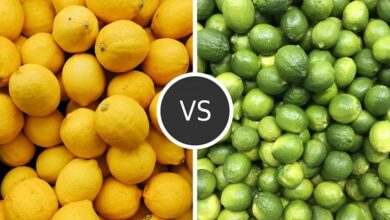Difference between oil and fat Similarities and FAQs
Oil and fat
In this article we will provide you the difference between oil and fat, Similarities and FAQs.
what does oil mean
Oil is a viscous, colorless and generally non-volatile liquid obtained by pressing or distilling oilseeds (for example: sunflower, corn, almond or sesame). Oils can also be obtained from fruits (olive) and animal fatty bodies. It is commonly used for cooking in food preparation, as a healthy seasoning due to its unsaturated fatty acid content. It also has many industrial applications such as lubricants for engines and machinery, fuels for domestic heating and electrical production, among others. The oil has also been used in medicine for therapeutic purposes for centuries as a natural healing remedy for the treatment of various ailments.
Enhance your reading: Difference between questionnaire and survey Similarities and FAQs
what does fat mean
Fat is a naturally soft substance found in many foods, such as dairy products or meat. It is also produced in the human body and plays an important role in the healthy functioning of the body. Fats contain fatty acids, making them important for providing the body with energy and helping to absorb fat-soluble vitamins. Excess fat can lead to obesity and other chronic health problems like diabetes, high blood pressure, and high cholesterol. The recommended amount of daily fat intake depends on individual lifestyle; however, there are several different types (saturated, trans, and unsaturated) that must be properly balanced for the best health results.
Similarities Between Oil and Fat
Both words oil and fat are oily liquids. They are made of triglycerides, which are molecules made up of one part fatty acid and three parts glycerol. Although the chemical composition is similar, there are some important differences between the two. The oil is mainly extracted from fruits such as coconut, while the fat is obtained from animal and vegetable adipose tissue. Fats are usually less dense and much more stable under normal conditions than oil; however, both melt at room temperature when unrefrigerated. Both provide calories for our body equally during digestion.
Differences between oil and fat
oil and greaseThey are liquid or solid materials that are Chinese . In addition, it was used to lubricate the movement of mechanical parts. Oil is a viscous, colorless and odorless substance made mainly on a mineral or synthetic basis with chemical additives. It is lighter and has a lower melting point than fat. On the contrary, fat is a slightly viscous mixture composed of various types of animal or vegetable oils combined with wax as the primary material for its formulation. It generally contains pigment to facilitate its visual identification, although some variants have a white color due to the oils derived from the hydrogenated triglyceride used in these formulations. Grease normally has greater resistance to pressure and higher temperatures than oil; however,
Frequent questions about oil and fat
What is oil and what is it for?
Oil is a viscous, yellowish liquid derived from certain vegetables or minerals. It is Chinese . In addition, it was used to lubricate engines, machines, gears, etc., to prevent wear and minimize friction between its moving parts. It is also used as a fuel in some types of engines; as an ingredient in cosmetic and food products; for the manufacture of paints; as an additive in detergents, among other uses.
What benefits does the oil have for health?
The oil has numerous health benefits. Some of the most prominent are: -It can help reduce cholesterol and triglycerides in the blood, which reduces the risk of heart problems. -It has anti-inflammatory and antioxidant properties, so it can be useful to relieve symptoms such as joint pain or inflammation. -It is a healthy source of monounsaturated and Omega 3 fats, important for our body. -It has been linked to greater control of blood sugar, thus improving glucose levels in people with type 2 diabetes.
What is oil in chemistry?
Oil is a non-polar liquid generally obtained from the processing of fruits, seeds or plants. It is commonly used in the manufacture of personal care products, cosmetics, and foods. The oil is mainly made up of saturated and unsaturated fatty acids, as well as other chemical components such as triglycerides and phosphorous.
How is the oil obtained?
Oil is obtained from plant or animal sources through processes such as extraction, refining, distillation, and separation. The oil can also be obtained from synthetic materials through chemical production.
What a fat?
A fat is a class of lipids, composed mainly of fatty acids and glycerol. They are found naturally in foods such as butter, olive oil, vegetables, and nuts. Fats are important in providing our bodies with energy, help with the absorption of fat-soluble vitamins, and protect us from external injuries.
What is fat and types of fat?
Fat is a type of macronutrient that provides the body with energy. There are two main types of fat: saturated and unsaturated. Saturated fats are found mainly in animal foods, such as meat, cheese, and butter; while unsaturated fats are found primarily in plant foods, such as olive oil, nuts, and avocados. Excessive intake of any type of fat can be detrimental to your health if it increases your risk of heart problems or diabetes.
What is fat and its function?
Fat is an important connective tissue found in the human body. It is composed mainly of lipids and helps store energy, protect internal organs, maintain body temperature, and absorb nutrients. Fat is also a component of cell membranes and plays a role in many important chemical reactions in the body.
What is healthy fat?
Healthy fat is a type of fat that contains saturated, monounsaturated, and polyunsaturated fatty acids. These fats are found in foods such as olive oil, nuts, seeds, and fish. These fats help lower bad cholesterol (LDL) while increasing good cholesterol (HDL). They can also help prevent heart problems, diabetes, and obesity.




